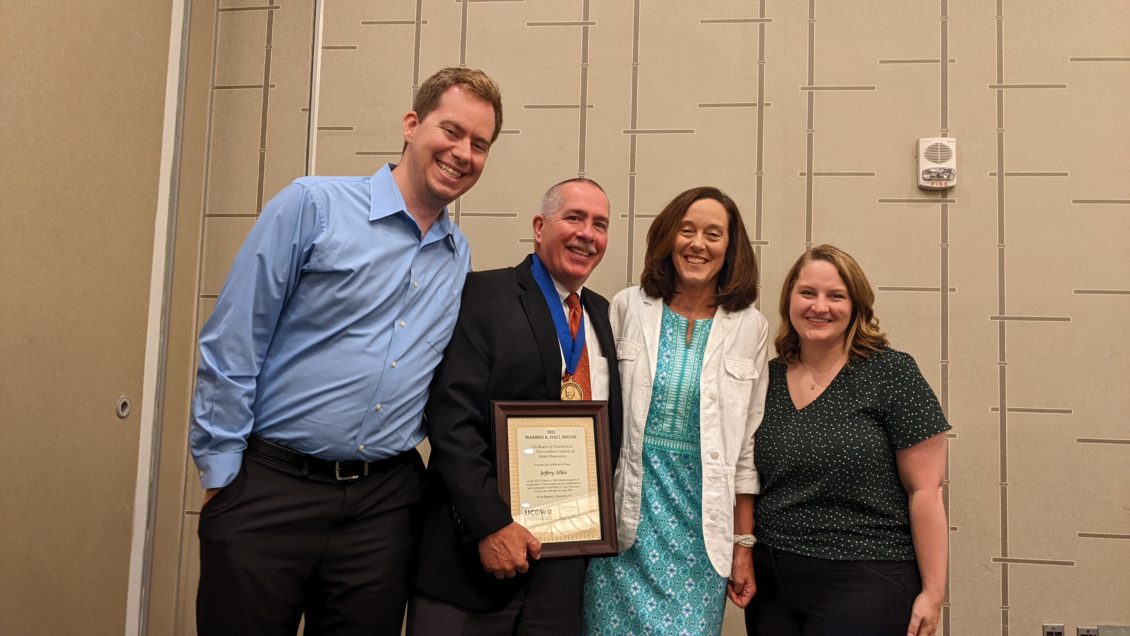
Jeffery Allen, director of the Clemson University South Carolina Water Resources Center, was awarded the 2022 Warren A. Hall Medal by the Universities Council on Water Resources (UCOWR).
The Hall Medal is a lifetime achievement award that recognizes the “distinctive scholarly accomplishments of an individual in the field of water resources” and is named in honor of Dr. Warren Hall, known worldwide for his role in water resources education and research.
UCOWR presented the award during its annual national conference held in June in Greenville.
In his remarks, Allen thanked his colleagues and family, who were in attendance, and spoke of challenges he overcame early in his career with help from a welcoming community of water resources scientists and policymakers.
“My hope is that my work can inspire the young and upcoming water resources researchers to stick with it. We need their fresh minds to tackle water resource management and policy issues not just currently upon us, but those we will encounter well into the future,” Allen said.
Allen has had a long and distinguished career in researching South Carolina and regional water issues and in helping inform water policy. His work includes directing Clemson’s Strom Thurmond Institute of Government and Public Affairs and serving on numerous regional and state committees and advisory councils focused on water resources management and planning.
Allen has been the principal investigator on multiple projects sponsored by federal, state and local government agencies and has led research projects on the topics of urban growth models, water supply planning and management, coastal and beachfront management and the economic analysis of reservoir management in the state.
He is also past president of the National Institutes for Water Resources.
“Jeff exhibits many of the characteristics of Dr. Hall’s legacy. He is an unpretentious educator devoted to the advancement of knowledge in water resources who truly enjoys his work and has become the go-to water expert for stakeholders in South Carolina,” said Bridget Guerrero, associate professor of agricultural business and economics at West Texas A&M, and UCOWR president.
In addition to the awards presentation, Clemson University water resources researchers and Cooperative Extension Agents made several presentations during the two-day UCOWR conference.
Amy Scaroni, assistant professor and Extension specialist in Clemson’s Department of Forestry and Environmental Conservation and Guinn Wallover, water resources Extension agent, presented, “A Road Map to Restoration: Community Driven Watershed Planning on Edisto Island, SC.”
Scaroni and Wallover detailed the process of including community input to create a watershed plan to address pollution in Store Creek, the South Edisto River-Atlantic Intracoastal Waterway and the Dawho River-North Edisto River.
After identifying community concerns and potential sources of pollution, Scaroni and Wallover created a watershed plan to reduce bacteria and sediment issues. The plan resulted in a grant to fund the community’s efforts to clean its water and revive its shellfish industry.
“In addition to developing a better, broader understanding of the watershed, the other parts of the watershed assessment include ‘windshield surveys’ — which really means driving around and touring the watershed and ground-truthing things that we may have seen on our GIS maps,” Scaroni said.
In her presentation titled “The Hybrid Training Model: Effective, In-Depth Water Resources Management Education,” Clemson Extension water resources associate Kim Morganello made the case for the successful implementation of hybrid training models in water resources education. Hybrid training models include both an online component and hands-on field day component allowing people to take classes anywhere at their own pace.
Morganello highlighted Clemson Extension’s Master Pond Manager and Master Rain Gardener programs as two successful hybrid training models.
Debabrata Sahoo, associate professor of sustainable water resources engineering, presented “Watershed Modeling to Improve Water Quality — An Engineer’s Perspective.”
Sahoo, who came to Clemson after a 12-year career at Woolpert, an architecture, engineering, geospatial and strategic consulting firm, looked at the effectiveness of taking a bottom-up approach — from municipalities upward to regulatory agencies — to water resources planning.
Lucas Clay, graduate research assistant in Clemson’s Department of Forestry and Environmental Conservation, presented his research on quantifying the value of the ecosystem services in aiding watershed management and planning.
Katie Callahan, director of the Clemson University Center for Watershed Excellence presented “Challenges, Growth and Future Objectives of the South Carolina Adopt-A-Stream Program,” a citizen science program focused on monitoring and tracking water quality while sharing information about local water resources with their communities to provide baseline information about stream conditions.
Jose Payero, who leads the Clemson University Irrigation Research and Extension team, presented his findings in the efficacy of using a wireless sensor network to automate the irrigation of cotton, and Chris Post, professor of environmental information science and leader of Clemson’s Intelligent River Project, talked about low-cost and reliable solutions for monitoring waterways such as rivers and streams.
Get in touch and we will connect you with the author or another expert.
Or email us at news@clemson.edu
